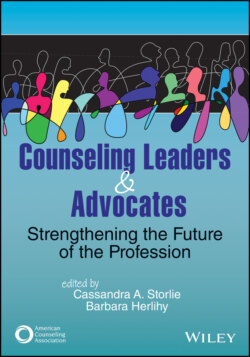Читать книгу Counseling Leaders and Advocates - Группа авторов - Страница 30
Moving Toward Culturally Responsive Counseling Leadership and Advocacy
ОглавлениеConsistent with a proliferation of scholarship about leadership and advocacy, multiculturalism, advocacy, and social justice have become intertwined as the counseling profession has evolved (Lee, 2012; Ratts, 2011). Incorporating multiculturalism and social justice can occur at multiple systemic levels of leadership (Cashwell & Barrio Minton, 2012; Chan et al., 2018, 2019; Storlie, 2016; Storlie & Jach, 2012). As an explicit example, Cashwell and Barrio Minton (2012) identified myriad ways for administrators and leaders to meet their responsibility for institutionalizing multiculturalism and social justice into the culture and operations of academic units (e.g., departments). Other counseling leaders (Chan et al., 2018; Day-Vines et al., 2018; Remley & Herlihy, 2020; Singh, Appling, & Trepal, 2020; Singh, Nassar, et al., 2020) highlighted the importance of establishing multiculturalism, advocacy, and social justice as intuitive priorities across the counselor education curriculum, which would ultimately become a cultural norm rather than an isolated specialty. The Council for Accreditation of Counseling and Related Educational Programs (CACREP) 2016 Standards (CACREP, 2015) address social and cultural foundations as a core area, and the ACA Code of Ethics (ACA, 2014) further outlines multicultural competence as an ethical obligation for counseling practitioners, supervisors, and counselor educators.
Culturally responsive leadership has been evident in school and educational research for some time (Johnson, 2006; Madhlangobe & Gordon, 2012). We have seen that “school counselors must understand how their skills and ethical responsibilities interface within the context of their one school system and the idiosyncrasies and interactions that exist within and across various systems” (Beck et al., 2018, p. 45). We acknowledge, however, that little has been written about culturally responsive leadership for the remaining specialty areas within the counseling profession (e.g., clinical mental health, clinical rehabilitation, counselor education and supervision), and much more work is needed (Peters & Luke, 2021). It is essential to explore how we can best engage in cultural responsiveness through the lens of counselor leadership and advocacy in the current times of social unrest and systemic injustice against communities of color.
